
 |
The Kuklapolitan Website was pleased to receive a note from Bruce Berquist (1925 - 2011), who described himself as "one of the luckiest men in TV," since he was the cameraman for KFO from 1950 to 1954. Of course, I followed up with an interview, and in the summer of 1999 Bruce shared some great stories on life "behind the scenes" with the Kuklapolitans. Thanks, Bruce!
When KFO left NBC in 1954, Bruce continued at WNBQ in Chicago (which soon became WMAQ), working at virtually every job in the engineering department. Beginning in 1972, he traveled with NBC Sports and NBC News as a technical director, covering events in the eastern half of the country until his retirement in 1985. Bruce shared some of his KFO Christmas gifts with The Kuklapolitan Website.
Luck, I guess. I got out of the service in '46, and I saw this ad in the Chicago Tribune: "Get Into Television - The Latest blah, blah, blah" - you know. Of course, there were practically no television stations in Chicago then, but I thought, "what the heck," and gave it a shot. I went to a school called American Television Laboratories - kind of a fly-by-night thing, taking advantage of the G.I. Bill of Rights - but they had a lot of good instructors there. It was almost a three year course, and when I got out, my father, who had been a musician at NBC radio since 1928, arranged an interview at WNBQ.
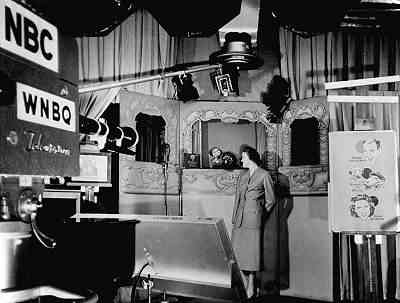 I
started out as a summer relief audio engineer in radio, and
in the fall
of '50, TV opened up and I got a job there. I was kind
of lucky,
because there were a lot of promotions among the crew, and
though I
started
out as a boom operator, within a couple of weeks I was a
cameraman on
KFO.
At first, I just operated the camera that did the
commercials, but the
fellow on the main camera had eye trouble, and in a couple
of more
weeks
I graduated to the main camera.
I
started out as a summer relief audio engineer in radio, and
in the fall
of '50, TV opened up and I got a job there. I was kind
of lucky,
because there were a lot of promotions among the crew, and
though I
started
out as a boom operator, within a couple of weeks I was a
cameraman on
KFO.
At first, I just operated the camera that did the
commercials, but the
fellow on the main camera had eye trouble, and in a couple
of more
weeks
I graduated to the main camera.
When did you start with the show?
It was September of 1950. I was only 25, so I was kind of nervous, walking right into a network show my first day at the station. Even though the network didn't go west of the Mississippi 'til 1952, KFO was already a big show. I mean, you had "Howdy Doody," that was . . . well, that was a show for moron kids (laughs) . . . we were a little better than that!
So KFO was intended for both adults and children?
It definitely included adults in its audience - look at the guests we had: Carol Channing, June Lockhart, Dave Garroway, Lena Horne, Robert Q. Lewis, Jose Greco. And Gommy (Lewis Gomavitz, KFO's director), always went out of his way to introduce every guy in the crew to these guests.
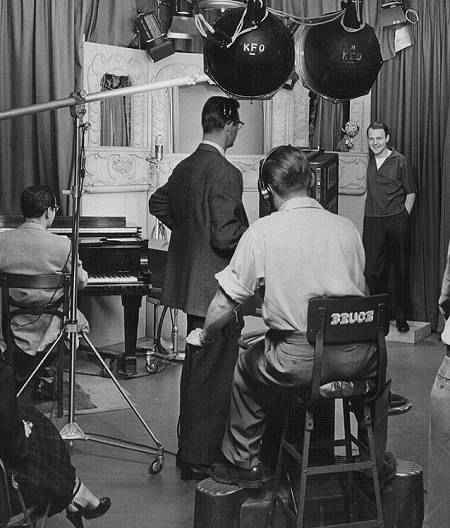 Did
Burr ever allow guests to sit backstage and watch him
perform the show?
Did
Burr ever allow guests to sit backstage and watch him
perform the show?
Not that I know of - I never saw anybody backstage, except Joe Lockwood (the costume designer).
But there was a small audience in the studio, right?
Yes, they squeezed about twenty people into that little studio. In the fall of '52, they moved to a larger studio, and that held more people.
What was a typical day on the show like for you?
I'd start with KFO at about 4:30. We'd rehearse the opening and close, and rehearse the music: Fran's songs, Kukla's songs, whatever. And that was the only rehearsal we did. Burr would get out there and try a new costume or a bit of business once in awhile, or he might play "Find Kukla" or "Find Buelah" with me - they'd try to hide from the camera, and I was not allowed to look around the viewfinder hood to find them. He'd do that in rehearsal sometimes if he was in a frisky mood - which wasn't that often. And then at 6 pm, we were on the air live.
Were you told the plot for that day's show before you went on the air?
No, I had no idea. I would just wing it along with Burr.
You mentioned in your note that Kukla was in charge on the set. . . how did that work?
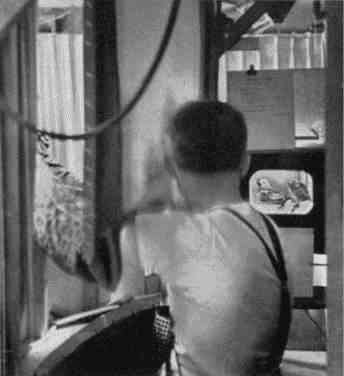 Well,
Kukla was definitely Burr's alter-ego, and Burr had a
problem talking
"man
to man," if you will. For example, Burr had the
best
monitor
money could buy backstage, and I had to check it each day to
make sure
it was sharp. Which I always did, but then Kukla would
come up
and
bitch about his monitor, that it looked terrible. So
John Natale,
the technical director, would say, "Bruce, go back and see
what's wrong
with the damn monitor." I'd go back again and ask Burr
what was
wrong,
and Burr would say, "Well now, it's not too bad. I
guess maybe I
just have a hangover today." He wouldn't complain, but
Kukla . .
. boy, could he bitch! (laughs) Yeah, Kukla was a real
crab. . .
Well,
Kukla was definitely Burr's alter-ego, and Burr had a
problem talking
"man
to man," if you will. For example, Burr had the
best
monitor
money could buy backstage, and I had to check it each day to
make sure
it was sharp. Which I always did, but then Kukla would
come up
and
bitch about his monitor, that it looked terrible. So
John Natale,
the technical director, would say, "Bruce, go back and see
what's wrong
with the damn monitor." I'd go back again and ask Burr
what was
wrong,
and Burr would say, "Well now, it's not too bad. I
guess maybe I
just have a hangover today." He wouldn't complain, but
Kukla . .
. boy, could he bitch! (laughs) Yeah, Kukla was a real
crab. . .

So
Kukla
would
say what Burr couldn't?
Absolutely.
More so than Ollie?
Ollie was a good head - Ollie never complained. Kukla was the perfectionist that Burr was. He was in charge of the Kuklapolitans, so he had a lot of responsibility.
How did Burr and Fran work together?
Fran was so easy-going, almost meek. She would do anything that Burr wanted, anything that was required. For example, some of her costumes - say for the Christmas shows - she had to wear all this heavy outdoor clothing under those hot lights. But she went along with it.
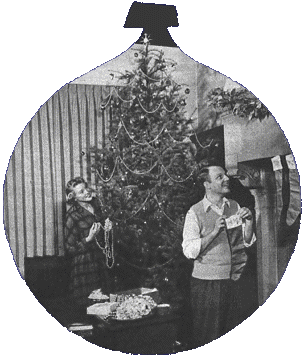
Speaking
of
Christmas, Burr threw good Christmas parties - he had this
coach
house
at 1500 N. State Parkway, and Jack Fascinato would play the
piano, and
there was a lot of good-natured drinking going on, and a lot
of good
food.
And when the show went to once a week, with an orchestra,
they were
invited
to the party, too.
So it was fun working on the show?
It was a fun show to do, but you didn't get paid to have fun. They were tough - they were perfectionists. You didn't screw up on that show. I remember the opening, Kukla would come up and do a little shtick and then hold up the RCA logo, and that was my cue to zoom in on it - and I didn't miss that baby, I tell ya! I'd zoom in and hit it right on the money and hold it - that's the perfection they demanded. But there was no law against laughter, and I remember one show - when Ollie tried to spell "Mother" with blocks, but got it backwards and spelled "Rethom" instead - that I laughed so hard the Zoomar lens bounced!
I've heard the "Zoomar" lens mentioned in some of the shows. That was big news?
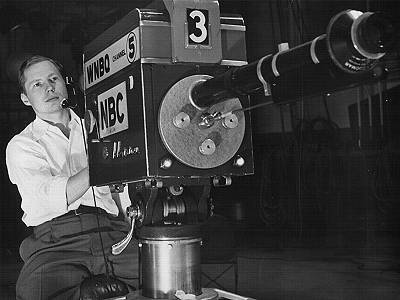 Yes
it was - the Zoomar was invented by a chap named Dr. (Frank)
Back. It's that
long scope contraption you see in the photo of me.
This lens was
meant to be used out of doors, and required a lot of light -
they had
to
throw 500 foot-candles of light on the KFO stage to get any
resolution
at all.
Yes
it was - the Zoomar was invented by a chap named Dr. (Frank)
Back. It's that
long scope contraption you see in the photo of me.
This lens was
meant to be used out of doors, and required a lot of light -
they had
to
throw 500 foot-candles of light on the KFO stage to get any
resolution
at all.
Having a zoom lens must have made it a lot easier to frame the puppets tightly or to pull out to show Fran and the stage.
That's
correct - and it had to be done on the spur of the
moment. I had
to think as fast as Burr sometimes to figure out what the
heck he was
going
to do next! A dolly camera wouldn't have cut it.
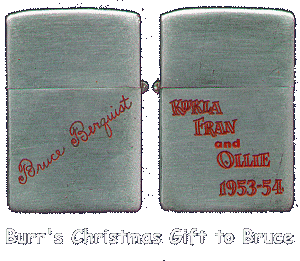
Did
the
Kuklapolitans ever talk to you on the air?
I remember
in '53, my first daughter was born. I gave Burr a
cigar before
the
show, and Ollie came up with the cigar in his mouth, and he
congratulated
me on the air, and Frannie did, too. And there were a
couple of
other
instances - little quickies, like "Hey - watch it, Bruce,"
or something
like that.
What was Beulah Zachary, the producer, like?
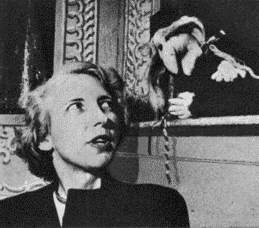 I
liked Beulah. She was tough, and she was smart, but
she was fair
and she liked a good laugh every once in a while.
Beulah could
never
be accused of being sweet, but I liked her. I never
had a bit of
trouble with her - she'd welcome you if you were new on the
show, and
after
watching the "off the air" version of each show in the
office, she'd
come
into the studio and say, "Good job," if you deserved
it. So she
was
not afraid to compliment people . . . but don't screw up!
I
liked Beulah. She was tough, and she was smart, but
she was fair
and she liked a good laugh every once in a while.
Beulah could
never
be accused of being sweet, but I liked her. I never
had a bit of
trouble with her - she'd welcome you if you were new on the
show, and
after
watching the "off the air" version of each show in the
office, she'd
come
into the studio and say, "Good job," if you deserved
it. So she
was
not afraid to compliment people . . . but don't screw up!
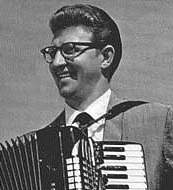 One
incident I recall was when I was working on another show in
the morning
with the Art Van Damme quintet. That was a fun show,
with Hugh
Downs
and a girl singer. They were absolutely excellent
musicians - and
they were all crazy, too! And some of the rehearsals
got a little
wild, and one time they got too loud and Beulah called up
Jules
Herbuveaux,
the man in charge, to complain. And Jules himself came
down from
the 20th floor and told us to hold it down.
One
incident I recall was when I was working on another show in
the morning
with the Art Van Damme quintet. That was a fun show,
with Hugh
Downs
and a girl singer. They were absolutely excellent
musicians - and
they were all crazy, too! And some of the rehearsals
got a little
wild, and one time they got too loud and Beulah called up
Jules
Herbuveaux,
the man in charge, to complain. And Jules himself came
down from
the 20th floor and told us to hold it down.
And how about Gommy?
He was one of the boys - Burr's henchmen. There was nothing to direct in the show, really - he'd rehearse the opening and close of the show every day, and he always got the opening and close down. He'd cue the stage manager, and cue Burr, and give him a countdown at the end of the show, but that was about it.
It must have been a challenge doing a live, ad-libbed show every day.
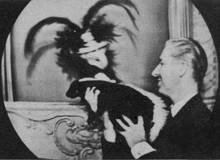 I
remember one show with Marlin Perkins as a guest. He
brought a
skunk
on the show. The scent glands were gone, but he got diarrhea
on the
show!
Luckily, it was right near the end of the show, but I mean
big time -
it
was running down the front of the stage. And Burr came
out at the
end of the show, with Kukla carrying a mop and a pail.
But Gommy
had to clean it up. The stagehands disavowed it - it
was not in
their
contract!
I
remember one show with Marlin Perkins as a guest. He
brought a
skunk
on the show. The scent glands were gone, but he got diarrhea
on the
show!
Luckily, it was right near the end of the show, but I mean
big time -
it
was running down the front of the stage. And Burr came
out at the
end of the show, with Kukla carrying a mop and a pail.
But Gommy
had to clean it up. The stagehands disavowed it - it
was not in
their
contract!
 Do
you have any memories of favorite shows?
Do
you have any memories of favorite shows?
I liked the holiday shows. Burr welcomed holidays - they gave him a theme, of course. He would do a whole week's worth of Christmas shows, all the cast interacting - what plans they had and all that. And there was nothing like that show to put you in the Christmas spirit! Kukla and Fran singing, "It's Christmastime in the City." I'll never forget that.
And you
know, here's an important point to remember: with all
those cast
members, and with all that interaction, you forget that you
never saw
more
than two puppets on the stage at once. Many
years later he
did specials with a bunch of the Kuklapolitans on stage at
once, but I
felt that was kind of a corruption of the show. I'd
walk in the
studio
and see a big table with three Kuklas lying there, with
different
costumes
on - ugh, that was sickening.

So
you really thought of the Kuklapolitans as real people?
Oh, absolutely. Whaddya mean - they were real people! (laughs)
A lot
of people seem to react that way.